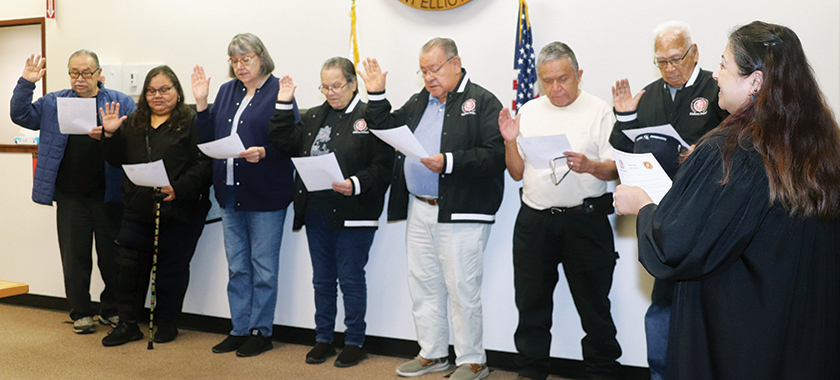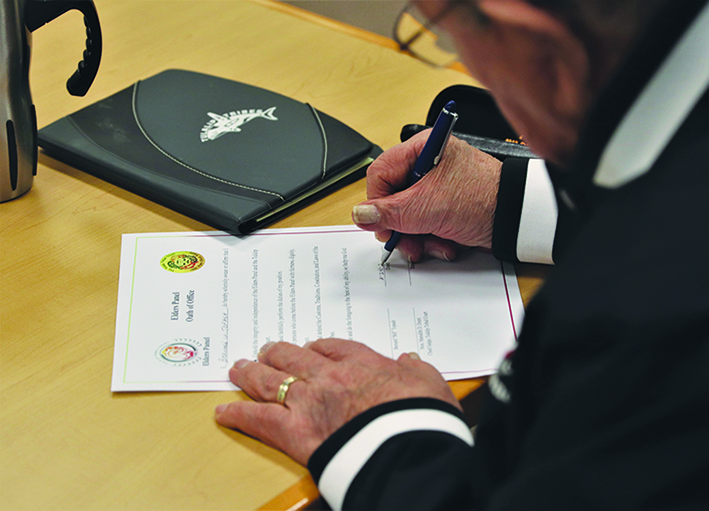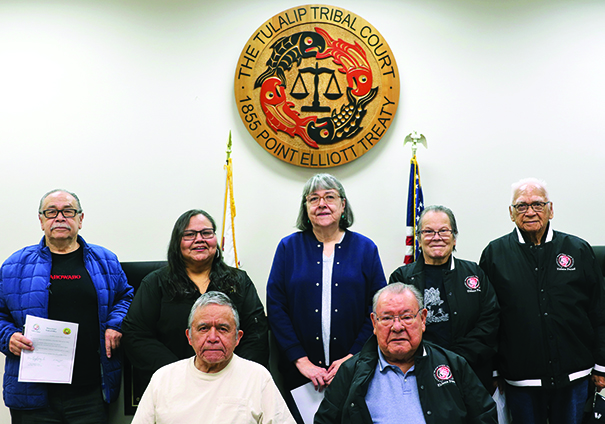
By Micheal Rios, Tulalip News
On the morning of Monday, March 24, an astounding 601 years of lived experience and accumulated wisdom convened in courtroom #3 of Tulalip Tribal Court. The 601 years representing the combined ages of Hank Williams, 94, Bernard Topash, 87, Marie Zackuse, 76, Ray Fryberg, 74, Andy James, 69, Audrey Charles, 69, Judy Joseph, 69, and Denise Hatch-Anderson, 63, who were sworn-in as members of our newest Elders Panel.
The Elders Panel program originally launched in 2006 after development by a joint effort from Tribal Court judge Gary Bass, prosecutor Tom Russell, and respected elder Donald “Penoke” Hatch. The three collaborated to create the Elders Panel to address the effects of criminal justice involvement among the youth. They thought elders could help court-involved youth by teaching them about their Tribe, present-day cultural practices, and their individual family history.
Since its ’06 inception, the Panel served hundreds of participants and yielded a near 90% success rate. However, its momentum came to an abrupt halt thanks to a global pandemic. Out of an abundance of caution to protect our community’s wisdom keepers, who were most vulnerable to Covid, the program was paused.

Now, after taken their oaths of office in the presence of Tribal Court Chief Judge Meredith Drent, the eight-person Elders Panel is restored and ready to change lives once again.
Among the new Elders Panel members is Denise Hatch-Anderson. She’s the daughter of Penoke who not only co-created the Panel, but was himself a sitting member of the Panel for over a decade. She understands its rather large shoes to fill, replacing her dad, but she’s excited at the prospects of engaging with youth, earning their trust, and helping them find a good way.
“I was honored my dad asked me to step into his seat because I’ve worked with the youth my whole life, retired as an educator, and know many of the families out here,” shared young elder Denise, the first 2nd generation Elders Panel member. “Many in our community have seen me in action over the last 10 years or so helping families and helping kids better themselves by getting into necessary programs. Much of the root cause is unrecognized and unhealed trauma.
“A lot of times, our youth don’t trust people, and in order to talk about their trauma, really talk about it, they need someone they trust in order to open up and start the healing process,” she continued. “With me, I’m not only a familiar face, but there’s a good chance I’ve worked with their family or even themselves individually in the past. That gives me a foundation of familiarity and trust that can really help to create open and honest conversation not just about their past, but also their future. I’m invested in their future, too, because their future is our future.”
Elders Panel is scheduled to convene the 1st and 3rd Monday of every month. They will meet with non-violent, first-time offenders, typically in the age range of 18-25, who have been charged with minor criminal offenses. Examples include possession of alcohol, possession of marijuana, and criminal mischief. Instead of prosecuting such offenders in Tribal Court, they are given an alternative route to have their offenses dismissed by participating in Elders Panel.

Tribal Court is actively identifying new ways to incorporate Elders Panel into additional services beyond first-time offenders. “We recognize the value and wisdom the elders bring to our justice system. [Accordingly,] the Court is seeking to build increased partnerships between the Elders Panel and other court programs, such as the Wellness Courts and Probation,” elaborated Interim Court Director Jehrad Kimble.
Elders Panel requires its participants to actively engage in their community and culture. This way, under the guidance of their esteemed elders, the individual learns the impact their actions has not just on their life, but the lives of their family and ensuing ripples created within the community as well.
Requirements may include regular appearances before the Panel, writing letters of apology, community service, mental health evaluations, and no new violations. Cultural participation can include conducting family research to create a detailed family tree and traditional activities, such as Canoe Journey, a Lushootseed class, or learning to harvest cedar.
When the defendant has completed all tasks asked of them by their Elders Panel, their case is then referred back to Tribal Court for dismissal.
“It’s a privilege for our family to be asked to work with the youth. I use the word youth because to me that’s what anyone under the age of 30 is,” said Elders Panel chairman Bernard Topash. His brother Bill served on a past Panel. “In many ways, what we are trying to do is act as grandparents.
“As an elder, I’ll tell you it’s gratifying work to help a young person find their way,” he continued. “Those who appeared before us in the past found employment, got their driver’s license and car insurance, and, without exception, learned more about their family and made a stronger connection to their Tribe.”
Enrollment in the Elders Panel program is voluntary. Those who are referred and opt-in have the opportunity to change their life trajectory. Defendants receive deferred prosecutions on their criminal charges for the length of their enrollment in the program, up to one year. Upon successful completion of the program, their charges are dismissed.
For first-time offenders, participation in a culturally-inclusive diversion program guided by elders isn’t just a chance at a fresh start. It’s a chance to reclaim a connection to their culture and find purpose within a shared community.